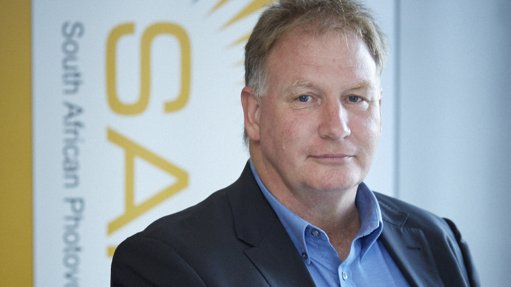
DAVIN CHOWN To electrify Africa and really tap its growth potential, we need to look at new, flexible models of energy generation and distribution
POWER-GEN & DistribuTECH Africa is crucial to business development on a continent where there are chronic energy shortages and access to modern, affordable energy services is critical to developmental objectives, says South African Photovoltaic Industry Association (Sapvia) chairperson Davin Chown.
“For the first time, people are starting to realise that . . . to electrify Africa and really tap its growth potential, we need to look at new, flexible models of energy generation and distribution – and that is exactly what happens at events such as POWER-GEN & DistribuTECH Africa.”
He adds that the event, which will be held at the Sandton Convention Centre from July 18 to 20, connects people in different sectors and countries and provides opportunities to build relationships and partnerships with energy players.
“Power is central to economic development and events like this are all about finding avenues, opportunities and collaboration in building power networks in South Africa and sub-Saharan Africa more broadly.”
Chown highlights that a key area of development in the region is solar power, owing to drastically reduced prices for solar photovoltaic (PV) systems. As a result, rooftop PV systems, more commonly referred to as small-scale embedded generation (SSEG), have gained attractiveness for individual and large electricity customers as a supplement to and, in many cases, a replacement for their existing expensive electricity supply.
Last year, the South African solar market registered 509 MW of new PV installations and the country’s cumulative PV capacity reached 1.47 GW as of the end of December last year. However, Chown notes that, although the unofficial installed capacity of SSEG is booming, only about 38 MW has been officially registered with the appropriate municipalities.
“Unfortunately, the regulatory framework for SSEG has not kept up with the growth in this sector. There is a lack of a clearly defined wiring code for SSEG systems and this is one of the key remaining barriers to preventing rapid expansion in the market.”
Chown adds that there is also a lack of established industry knowledge on best practices for PV system installation and Sapvia is working with the Council for Scientific and Industrial Research on this. The association is also coordinating closely with State-owned power utility Eskom and the South African Bureau of Standards to expedite the development of a set of guidelines and standards for the safe and reliable wiring, installation and operation of SSEG systems.
However, he notes that efforts are currently delayed, owing to a lack of dedicated technical staff.
Green Energy, GreenCard
Sapvia has launched its PV GreenCard Programme, which has been developed to promote safe and high-quality solar PV installations in South Africa.
The programme focuses on education, skills development and training to build installer capacity, as well as improve standards development and compliance in line with international best practice. The PV GreenCard was formally launched on May 26 and Chown reports an “overwhelmingly positive” response from industry and industry stakeholders.
“A key part of the PV GreenCard programme is a comprehensive document that qualified installers provide to clients on completion of an installation. It contains details of the installation, such as what sort of PV modules and PV inverters were used, as well a checklist of all of the necessary installation steps that were completed.”
The installer can use the PV GreenCard to declare compliance with relevant standards and safety guidelines for PV installation, consequently appealing to investor confidence, ensuring commitment from participating industry players and the empowerment of the end-consumer of solar PV technology.
“Sapvia has developed this quality framework to ensure that solar PV installations are done responsibly and sustainably. The SSEG revolution is already under way and, as the industry body, we have a crucial role to play in ensuring that installations standards are of a high quality and comply with municipal and national electrical regulations.”
Sapvia is ensuring its presence at POWER-GEN & DistribuTECH Africa this year through the attendance of several representatives, who will take advantage of the networking and collaboration opportunities.